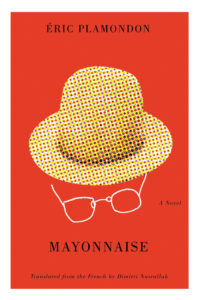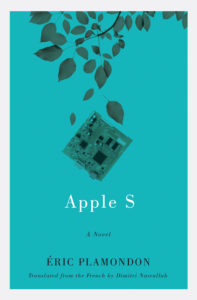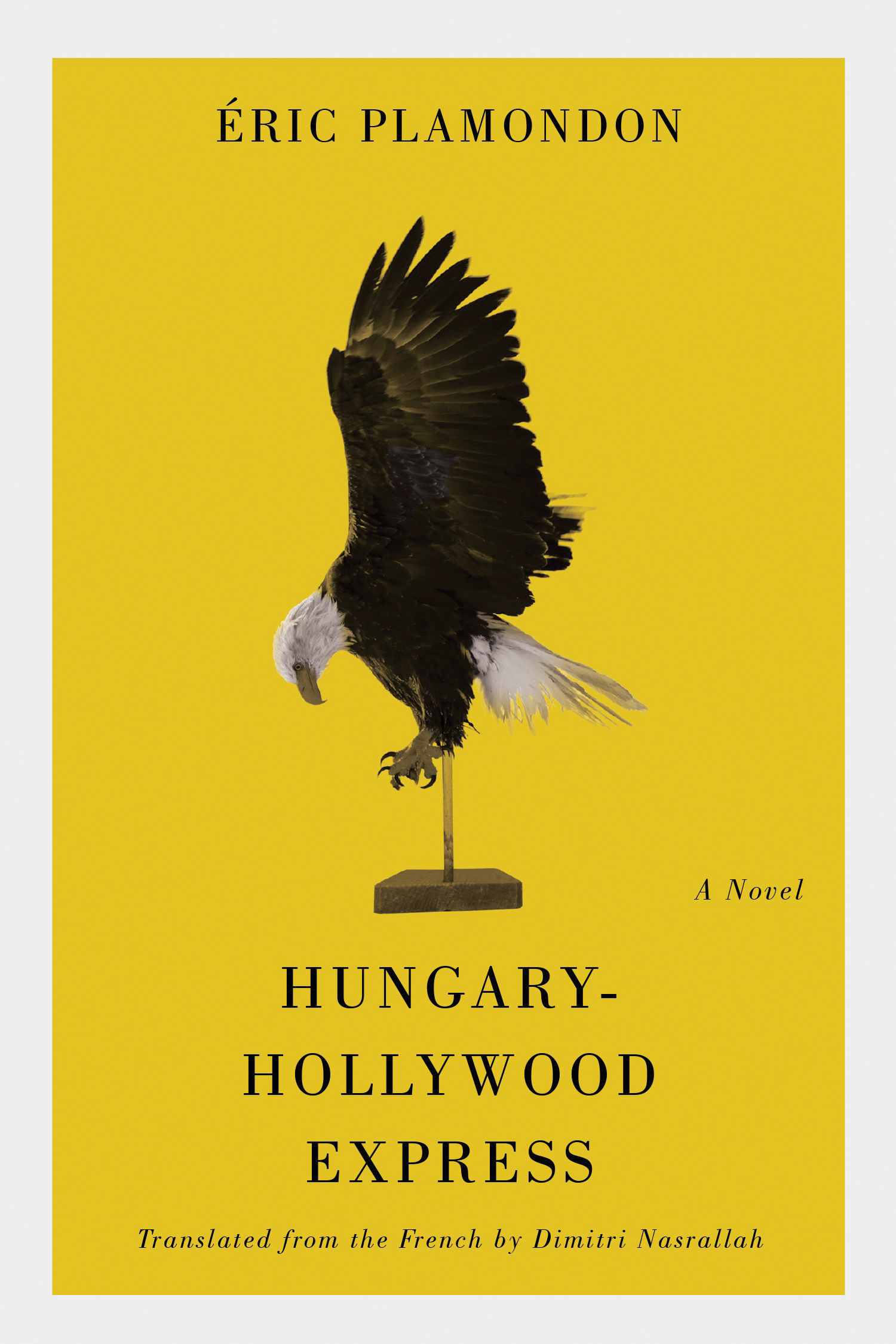The American Dreams of Éric Plamondon
Reviews
By André Forget
On January 20, 1984, the five-time Olympic Gold Medalist and decayed Hollywood dreamboat Johnny Weissmuller died in Acapulco of pulmonary edema at the age of seventy-nine. Two days later, Steve Jobs introduced the Apple Macintosh personal computer to America in a legendary spot during Super Bowl XVIII: a woman threw a hammer through a massive television screen in an homage to George Orwell’s classic dystopian novel, and everyone agreed that 1984 would be nothing like 1984. In the middle of September of that same year, forty-nine-year-old writer Richard Brautigan (best known for his 1967 counterculture novel, Trout Fishing in America) shot himself in the head with a .44 Magnum at his home in Bolinas.
What do these events have to do with each other? Aside from the fact that they took place in the same year involving people with ties to California, very little. Any year, chosen at random, is sure to furnish a rich supply of coincidences that could be narrated to create the illusion of significance. But in its limitless particularity, fiction has always obsessed over specific coincidences, and it is this chance confluence in the lives of Weissmuller, Brautigan, and Jobs that provides the fulcrum for the Quebecois novelist Éric Plamondon’s 1984 Trilogy.
Plamondon is not a well-known writer even in his native Canada, and his books have so far received a fairly modest reception—which is perhaps to be expected, given their unapologetic experimentalism and the fact that Quebecois(e)¹ fiction (with the exception of big names like Marie-Claire Blais and Dany Laferrière) tends not to be widely read outside of small circles in Canada and France. But there is a chance the 1984 Trilogy may change this. While it was originally published in French by Montreal-based publisher Le Quartanier in 2011–2013, the final volume of Dimitri Nasrallah’s excellent English translation came out with Esplanade Books last summer, meaning that the entire trilogy is now available to American readers who are, perhaps, its ideal audience.
It would be rather difficult to summarize the plot of these books. The first, Hungary-Hollywood Express, tells the story of Weissmuller, a Hungarian immigrant who reached the pinnacle of athletic achievement and became a film icon for his portrayal of Tarzan, living the American dream of Hollywood’s Golden Age in all its wealth and squalor. The second, Mayonnaise, is about Brautigan, the anti-establishment beatnik who wanted to dissolve literary and political hierarchies and embodied the soured optimism of the sixties and seventies. The final book follows Jobs, the middle-class rebel who turned the mores of his generation into some real money and became the avatar of the tech-utopianism that we are still living with today.

The story Plamondon distills from the biographies of Weissmuller, Brautigan, and Jobs is about many things—hubris and nemesis, idealism and disillusionment, immigration and emigration, California as a state of mind. But it’s also a story about the mythologization of America in the twentieth century, and the particular way mass media and celebrity have created the conditions for a fundamentally mimetic way of being. It would be presumptuous to suggest that the latest Great American Novel has been written in French by a Quebecois expatriate living in Burgundy, but it seems to be what Plamondon is trying for.
This capaciousness is possible in large part because Plamondon rejects the conventions of the realist narrative. Instead, his novels unfold in self-contained vignettes. Some of these deal with the lives of his principle characters, but they are interspersed with poems, meditations, and historical tangents—the story of the arms-and-typewriter manufacturer Remington, for example, or an account of how the Statue of Liberty, originally designed to welcome ships into the Suez Canal, ended up in New York Harbor.
The various strands are held together by Plamondon’s alter ego, the French-Canadian Gabriel Rivages, the trilogy’s narrator, curator, observer, compositor, and Greek chorus. Like his creator, Rivages was born in Quebec in 1969. An everyman with a taste for poetry, pop music, and American television, he constantly interrupts the stories of the main characters with anecdotes from his own ordinary life. His consciousness is the focal point through which the kaleidoscopic stories of Weissmuller, Brautigan, and Jobs align, the pier-glass that turns the random crosshatching of information into a series of coherent arcs. The effect is a blurring of identity: it’s not always clear who’s talking.
For example, here is fragment 65 from Apple S, titled “Vivre le Québec libre”:
The story is well known. In 1983, Jobs convinced the president of Pepsi-Cola, John Sculley, to quit by asking him if he preferred to continue selling sugar water for the rest of his life or join Apple instead and change the world.
Sculley begins making his name in 1975. He is then director of marketing at Pepsi. His mission is to win portions of the market from Coca-Cola. To do so, he launches a unique campaign that was called the Pepsi Challenge. It consists of blind taste tests that make for great television advertising. It works out really well, and Sculley rises through the ranks.
In 1976, there was a Pepsi ad with René Simard for the Quebec Carnival: “Rise up to the Pepsi Challenge, let yourself be swept away by the taste!” Next there were those with Claude Meunier dressed up as a hockey player speaking to Lionel Duval, host of La soirée du hockey. Quebec is the only region in the world where sales of Pepsi surpass those of Coca-Cola. As De Gaulle said, “Vive le Québec libre!”
The previous fragment, 64, is about Jobs’s relationship with his biological aunt, so the transition at first feels natural. But by the second paragraph, we’ve strayed from the main story, and by the third we’ve circled around to events in the background of Rivages’s childhood. In the final sentence, De Gaulle’s famous and (in Canada, at least) controversial endorsement of Quebec separatism at Expo ’67, capital-H History is collapsed into a corporate branding exercise, and we are suddenly reminded that this all started with Jobs’s promise that Sculley could change the world—so perhaps De Gaulle’s speech and Apple Computers and Pepsi have more in common than we think.
This kind of vertiginous play wouldn’t be nearly as fun if Plamondon stuck around to make sure we got the point, and part of the trilogy’s charm is that it never feels like these snippets of narrative have been meticulously plotted out. Instead, the connections and resonances emerge slowly, against the background of amusing anecdotes that are not in-and-of-themselves portentous. It is only when read in the context of the larger stories unfolding that they are revealed to sit exactly where they belong.
![]()
The Soviet literary critic Viktor Shklovsky believed that to create new kinds of content, you had to create new forms. These new forms, Shklovsky believed, weren’t produced through linear development—the gradual expansion of a tradition through generational innovations—but through cross-pollination and a “father on the side,” a sort of literary bastardy. Just as the novels of the seventeenth and eighteenth centuries resulted from the union of poetry and drama with travelogues, letters, and reportage, the modern and postmodern fiction of the twentieth borrowed from cinema, advertising, and gutter journalism. If we were to continue Shklovsky’s line of thinking, we might arrive at the conclusion that the unique forms of the digital age will borrow heavily from the para-literary worlds of social media, forums, wikis, and podcasts.
When Hungary-Hollywood Express was first released, Dominic Tardif, writing in Voir Magazine, called it “a novel for the Wikipedia generation.” But it would be more accurate to say it is a novel of the Wikipedia generation: if there really is something that marks our time out as being substantially different from previous eras, surely it is the raw deluge of unfiltered information we are subjected to every day.
To spend an hour online, clicking through social media, a newspaper comment section, YouTube, and Wikipedia is to be confronted with a barrage of decontextualized arguments, platitudes, images, and headlines it would take days to provide a coherent account of. Surely one of the benefits of conspiratorial thinking, from a psychological point of view, is that it saves a hell of a lot of time: all this information can simply be plugged into an existing framework. And indeed, there are plenty of moments when Rivages does seem like a bit of a crank, plotting the twentieth century with corkboard and yarn. But by writing a series of novels that mirrors this very contemporary experience, Plamondon has created a style that feels genuinely new.
It is also a style that at times suggests a critique of the surface meaning of the text. Apple S ends on an oddly banal note:
It took [Rivages] three lives to understand that happiness is only a fiction, that to be happy you have to invent your life, and that the only way to invent it is to tell it. This is what Rivages understood thanks to Weissmuller, Brautigan, and Jobs. The value of man is not in laughter, the value of man is not in making tools. The value of man is in telling stories.
There is nothing even remotely new in this pat celebration of narrative. But as a final statement of the authorial voice after a series of novels that have stretched to breaking point any conventional notion of “telling stories,” it’s hard not to read it ironically. The storytelling in these novels seems not magisterial but compulsive, the mental habit of a person who can no longer filter out the irrelevant information. If content flows out of form, then the 1984 Trilogy is really about the fragmentary and neurotic nature of mythmaking in the twenty-first century. Why is 1984 the year that serves in these novels as hinge of the late twentieth century? The date, as previously mentioned, has a symbolic resonance. But it also has, for Rivages, a personal importance: it’s the summer he loses his virginity.
The broad sweep of American cultural history over the past hundred years might be a matter of objective truth, but Weissmuller, Brautigan, and Jobs become emotional lodestones for Rivages because of formative chance encounters with their work in his childhood and adolescence. Postmodern fiction sought to deconstruct the grand narratives of the self and the nation by playing up the discontinuities and paradoxes, but as Rivages suggests (at times explicitly), there is no escaping mythology: it’s just that in a media-saturated era, those mythologies are necessarily idiosyncratic. Every individual has their own constellation of canonical works, their private network of signification.
![]()
It strikes me as significant that these books, which engage so deeply with America as an idea, are the product of a man who has never lived there. Weissmuller, Brautigan, and Jobs are all immigrants or the immediate descendants of immigrants. Weissmuller was born in Hungary and died in Mexico, Brautigan’s grandfather was born in Montreal, and Jobs was conceived in Syria. Not only did each of them come from somewhere else, their work has also inspired disciples far beyond America and the English language. They are Americans, but not narrowly so.

In the twenty-first century, for better and very much for worse, the story of America belongs to the world. This is not only because the country’s economic and military hegemony has touched every corner of the globe, but also because its cultural imaginary has shaped the thinking and altered the dreams of just about everyone—even those who have good reason to hate and fear it. America is a terminal through which we all pass, if only in our minds.
Plamondon, as a Francophone Quebecer living in Europe, is sensitive to the seductive danger of a country that has come to identify itself with an existential condition. Telling the story of America in the twentieth century as a series of comings and goings, of business deals and inventions and accidents and violent interventions that have unseen, world-historical effects, frees him from the constraints of the nation-building or nation-deconstructing epic. He says something about America, but he also says something about what it means to say something about America.
The penultimate chapter of Apple S consists of a long, apocalyptic acid trip in which Rivages crosses the North American continent and wades into the Pacific Ocean. A cascade of words and images passes before him. Apple Computers, the genocide of California’s Indigenous peoples, the Front de libération du Québec, Moses, Mozart, Orwell, Nazi gas chambers, Steve Jobs’s daughter, Mandelbrot fractals, Jacques Cartier’s attempt to claim the Gaspé for France in 1534—all are united in an ecstatic vision. And then he wakes up, feeling sick. He’s starting a new job at a large multinational corporation in a few days, designing game apps for the iPhone, and he’s hoping it will give him a chance to visit California.
This acid trip is the trilogy in miniature, a frenetic attempt to synthesize the horrific and the sublime. It ends the only way it can: with a return to the quotidian. Another novelist might have chosen to end the book here, but Plamondon understands that the dream doesn’t end just because you wake up. The real story isn’t history but our obsessive need to make sense of it.
1. Quebecois(e) fiction itself is a bit of a fraught category, but for the sake of this review it simply means fiction written in French and published in Quebec.
André Forget is a literary critic and contributing editor at Canadian Notes & Queries. His first novel, In the City of Pigs, will be published by Dundurn Press in 2022. He splits his time between Toronto and Yoshkar-Ola, Russia.
More Reviews



